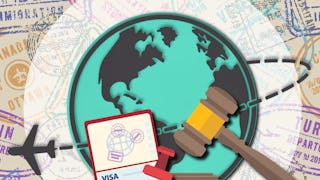In every era, individuals and families have been forced to flee their homelands due to war, persecution, or grave human rights abuses. This course offers a comprehensive overview of the legal, historical, and humanitarian frameworks that shape refugee protection and asylum in the United States. Drawing on international treaties, U.S. law, and real-world case studies, learners will examine the refugee definition, the processes by which individuals seek protection, and the durable solutions that uphold the right to live in safety and dignity.



Wichtige Details

Zu Ihrem LinkedIn-Profil hinzufügen
April 2025
4 Aufgaben
Erfahren Sie, wie Mitarbeiter führender Unternehmen gefragte Kompetenzen erwerben.


Erwerben Sie ein Karrierezertifikat.
Fügen Sie diese Qualifikation zur Ihrem LinkedIn-Profil oder Ihrem Lebenslauf hinzu.
Teilen Sie es in den sozialen Medien und in Ihrer Leistungsbeurteilung.

In diesem Kurs gibt es 4 Module
This module introduces learners to the historical and contemporary forces behind human migration, with a focus on forced migration due to persecution, violence, and human rights violations. Through global examples spanning the 19th century to the present day, learners will explore the origins of refugee movements and the evolving international legal frameworks designed to protect displaced individuals. The module provides an in-depth look at the development of the refugee definition under the 1951 UN Convention and the 1967 Protocol, the formation of the UN High Commissioner for Refugees (UNHCR), and how these instruments shaped U.S. refugee law, culminating in the 1980 Refugee Act. Regional expansions of refugee definitions in Africa and Latin America are also examined to highlight diverse approaches to protection.
Das ist alles enthalten
4 Videos1 Aufgabe3 Diskussionsthemen
This module explores the three internationally recognized durable solutions for refugees: voluntary repatriation, local integration (including asylum), and resettlement to a third country. Learners will examine the legal, political, and personal complexities behind each solution, including how host countries assess asylum claims, the role of the UNHCR in refugee status determinations, and the challenges associated with the resettlement process. Through global case studies and real-world examples, this module provides insight into how refugee protection operates in practice and the human implications of legal frameworks and international cooperation.
Das ist alles enthalten
6 Videos1 Aufgabe3 Diskussionsthemen
This module offers a guide to the asylum process in the United States, from filing the initial application to navigating court hearings and appeals. Learners will explore the difference between affirmative and defensive asylum claims, understand how cases are reviewed by asylum officers, immigration judges, and appellate bodies, and examine the essential role of legal documentation and consistent testimony. The module also highlights humanitarian parole and the crucial role of nonprofit organizations and cross-sector collaboration in supporting asylum seekers. Real-world examples bring the challenges and strategies of navigating the system to life, preparing learners to advocate more effectively or understand the journey for themselves or others.
Das ist alles enthalten
5 Videos1 Aufgabe3 Diskussionsthemen
In the final module, learners explore the critical steps and support systems that shape the post-asylum or post-resettlement experience in the United States. From applying for lawful permanent residence and eventually citizenship, to accessing work authorization, public benefits, health services, and legal support, this module outlines the rights and responsibilities that come with protected status. The course also addresses the psychological toll of displacement through the concept of “triple trauma” and highlights the importance of community engagement and civic participation. Whether learners are refugees, asylum seekers, or allies, this module provides practical tools for building a new life and strengthening belonging in the U.S.
Das ist alles enthalten
5 Videos1 Aufgabe3 Diskussionsthemen
Dozent

Empfohlen, wenn Sie sich für Governance and Society interessieren

University of London

University of Geneva

University of Pennsylvania

Universiteit Leiden
Warum entscheiden sich Menschen für Coursera für ihre Karriere?





Neue Karrieremöglichkeiten mit Coursera Plus
Unbegrenzter Zugang zu 10,000+ Weltklasse-Kursen, praktischen Projekten und berufsqualifizierenden Zertifikatsprogrammen - alles in Ihrem Abonnement enthalten
Bringen Sie Ihre Karriere mit einem Online-Abschluss voran.
Erwerben Sie einen Abschluss von erstklassigen Universitäten – 100 % online
Schließen Sie sich mehr als 3.400 Unternehmen in aller Welt an, die sich für Coursera for Business entschieden haben.
Schulen Sie Ihre Mitarbeiter*innen, um sich in der digitalen Wirtschaft zu behaupten.
Häufig gestellte Fragen
Access to lectures and assignments depends on your type of enrollment. If you take a course in audit mode, you will be able to see most course materials for free. To access graded assignments and to earn a Certificate, you will need to purchase the Certificate experience, during or after your audit. If you don't see the audit option:
The course may not offer an audit option. You can try a Free Trial instead, or apply for Financial Aid.
The course may offer 'Full Course, No Certificate' instead. This option lets you see all course materials, submit required assessments, and get a final grade. This also means that you will not be able to purchase a Certificate experience.
When you purchase a Certificate you get access to all course materials, including graded assignments. Upon completing the course, your electronic Certificate will be added to your Accomplishments page - from there, you can print your Certificate or add it to your LinkedIn profile. If you only want to read and view the course content, you can audit the course for free.
You will be eligible for a full refund until two weeks after your payment date, or (for courses that have just launched) until two weeks after the first session of the course begins, whichever is later. You cannot receive a refund once you’ve earned a Course Certificate, even if you complete the course within the two-week refund period. See our full refund policy.
Weitere Fragen
Finanzielle Unterstützung verfügbar,
 enthalten
enthalten
